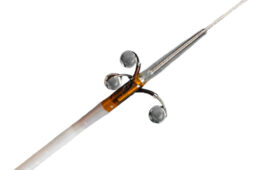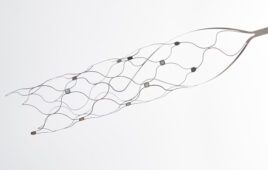
Donna Bibber [Photo courtesy of Isometric Micro Molding]
Bibber’s plastics engineering background, expertise and unique problem-solving skills earned her an excellent reputation and is recognized nationally and internationally for her work in micro manufacturing. Her expertise in intraocular implants, bio-resorbable polymers, and PEEK implants gave rise to many new devices commercially available today.
What first drew you to medtech? When did you first know you wanted to be in the industry?
Bibber: I remember the moment in the summer of 1988 when I was wowed into the world of miniaturization. I was working for Costar, which later became Corning Life Sciences’ diagnostic disposables division. In the very back of the building, in a tiny room was a research scientist who was working on the early stages of lab-on-a-chip. The scientist, whom I was peering over his shoulder, explained to me that with this technology, we would soon be able to prick your finger, place it on the polymer chip, and through capillary action, the blood would travel to a test area and we would be able to get a blood result within seconds vs. weeks it took at that time. I was hooked! I had to be involved in this industry!
What are some of the barriers women face in today’s medtech industry, if any?
Bibber: I would be fibbing if I told you everything went smoothly without barriers. In the early part of my career, I dealt with this the best way I knew how — with facts and a good bit of humor. There are times when women, men, people of color, of certain age, or all diverse backgrounds overcome barriers every day. I found the best way to address this was to be educated on the subject at hand, and no matter what the circumstances, be genuine and transparent with responses. If I don’t know, it’s okay to say “I don’t know”, but I’ll find the answer and circle back to whomever asked. It’s that simple. Does it always work 100% of the time and there aren’t still barriers? Heck no, but nobody can control all barriers, but I do what I can control to the best of my ability.
Is there a perception problem that makes women less likely to pursue medtech careers? If so, how can we change that?
Bibber: I would say that is not the case at all. It’s all about work ethic and networking with suppliers and customers of your industry. If we believe in ourselves and work hard, there’s nothing that can’t be accomplished. My dad, now 87 years old, told me when I started my first job scooping ice cream at age 15, there were two ways to be noticed: 1) Come in late, submit shoddy work, do the minimum, and leave before the boss. 2) Arrive early before the boss and leave after the boss, work hard, be vocal for what you believe is important, and excel in the most menial task asked of me. He would say, “Which way do you want to be noticed?” This still rings true for me today.
Describe your biggest leadership challenge. How did you conquer it or resolve it, or what was the outcome?
Bibber: Two years after receiving my plastics engineering degree, I was promoted to a manufacturing managerial position with process engineering responsibilities over process technicians (not that it should matter but then it did, all of the process technicians were men) who had many more years of practical processing experience than I had. We worked together to address the biggest efficiency challenges, setting achievable goals- first small ones and then challenging ourselves to much more difficult processing issues. We found that we had a lot in common- we all liked to solve problems. The results were that the process technicians were empowered, engaged, and successful in improved process control, reduced scrap, higher efficiency, and also engaged operators and other production personnel shift to shift in a fun and competitive way. I was pleased to see how much this type of team took off in the organization and the impact it had on everyone involved.
What is the most important lesson you have learned that has guided you in your career?
Bibber: Stick to what I know and what I do well. Find a niche in an industry that is growing and be really good at that niche. Study, research, and constantly revise SWOT analysis. Define core values of the organization, hire people with these same core values, and make the biggest business decisions based on these core values.
In your opinion, what more can be done to promote greater participation of young women in the medtech industry today?
Bibber: Volunteer to be mentors to young women at the earliest possible impressionable years. Educate at career fairs, volunteer STEM groups, and bring visually stimulating and interesting applications to show them, starting at the 5th grade level when children naturally articulate interest with inquisitiveness.
What career advice would you give to your younger self?
Bibber: Don’t take life so seriously. Expand your horizons with injecting fun into work and daily life, including your work life. Humor and humility are fantastic ways to show both integrity and genuineness.
Why is it important for companies to be more inclusive and have more women in charge?
Bibber: Diversity of ideas, people, and cultures leads to well-rounded concepts and a business strategy that results in: 1) Challenging previous industry norms by looking at opportunities through different perspectives; 2) Enabling technology and products that are more inclusive to global populations; and 3) The next generation of leaders are inspired and mentored by women continuing this important evolution in business.




